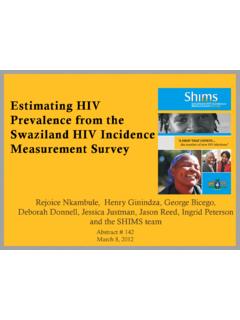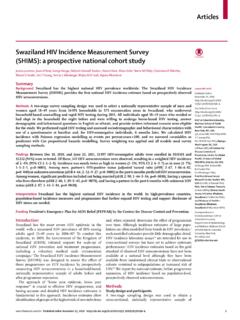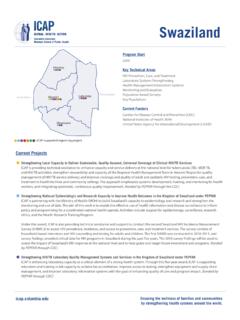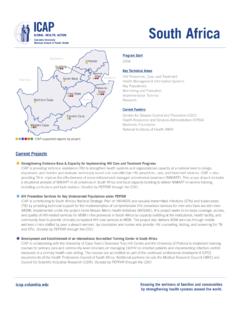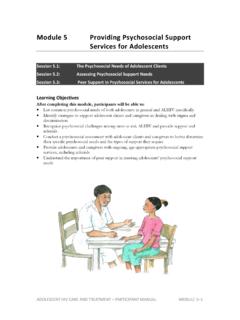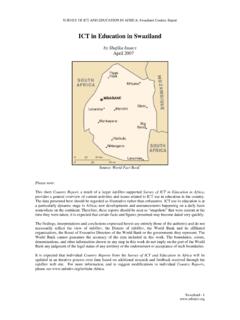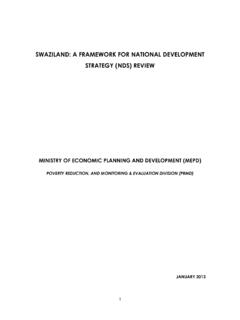Transcription of SWAZILAND - Columbia University
1 1 Rapid Scale Up and Decentralization of HIV Care and Treatment Services2009 2015 SWAZILANDI ntroductionTHE HIV RESPONSE IN SWAZILAND 1 PEPFAR SUPPORT 1 ICAP S ROLE 2 PARTNERSHIP AND COLLABORATION 3 Rapid Scale-Up Of HIV Care: How It Was AchievedACCESS TO HIV CARE AND TREATMENT SERVICES 5 DECENTRALIZATION TO PRIMARY HEALTH CARE FACILITIES 5 INFRASTRUCTURE IMPROVEMENTS 6 PRE-ART CARE 7 ART FOR ADULTS AND CHILDREN 7 INNOVATIONS TO SUPPORT STABLE ART PATIENTS 8 ADHERENCE AND PSYCHOSOCIAL SUPPORT 9TB/HIV INTEGRATED CARE 10 INTEGRATION OF HIV CARE WITH OTHER HEALTH SERVICES 11 REACHING THOSE THAT ARE HARD-TO-REACH 12 COMMUNITY LINKAGES 13 CONTINUOUS QUALITY IMPROVEMENT 14 IMPROVING TIMELY ART INITIATION 14 IMPROVING PEDIATRIC ART INITIATION AND RETENTION 15 TASK-SHIFTING
2 AND TASK-SHARING 16 NURSE ART INITIATION IN SWAZILAND 16 HIV EXPERT CLIENTS 17 TRAINING AND MENTORSHIP 18IN-SERVICE TRAINING 18 REGIONAL MENTORING TEAMS 19 LEADERSHIP, OWNERSHIP, AND STEWARDSHIP 20 NATIONAL TECHNICAL WORKING GROUPS 20 BUILDING THE CAPACITY OF REGIONAL HEALTH MANAGEMENT TEAMS 20 HEALTH SYSTEM STRENGTHENING 22 MONITORING AND EVALUATION SYSTEMS 22 RESEARCH 23 HEALTH RESEARCH TRAINING PROGRAM (HRTP) 23 SWAZILAND HIV INCIDENCE MEASUREMENT SURVEY (SHIMS) 24 RESEARCH AND EVALUATION ACTIVITIES 25 THE WAY FORWARD 25 About ICAPOUR MISSION 27 GUIDING PRINCIPLES 27 THE HIV CARE CONTINUUM 28 THE ICAP TEAM 30 Front & Back Cover Photos | Jake Price14 IntroductionThe Government of the Kingdom of SWAZILAND is committed to the scale-up and decentralization of HIV care and treatment services as a strategy to reach all those in need and advance the impact of SWAZILAND s response to HIV.
3 SWAZILAND , with a population of million people, is facing the world s most severe HIV epidemic with 31 percent of adults aged 18 to 49 years old living with HIV. HIV incidence is 80 percent higher among women than men, and 41 percent of pregnant women test The tuberculosis (TB) case rate is also among the highest in the world at 1,349 per 100,000 the past decade, with support from the President s Emergency Plan for AIDS Relief (PEPFAR) and implementing partners, the Government of the Kingdom of SWAZILAND has implemented a highly effective national HIV/AIDS program.
4 In 2012, SWAZILAND achieved the 80 percent benchmark for universal antiretroviral therapy (ART) coverage based on prevailing World Health Organization (WHO) guidelines, an historic achievement. High quality HIV care and treatment services are now widely accessible at primary health care facilities and community health structures, and remarkable innovation in HIV programming, championed by the Ministry of Health (MOH) and the SWAZILAND National AIDS Program (SNAP), has energized the overall national health system. PEPFAR has supported SWAZILAND s HIV response since 2005.
5 This support has enabled the government to establish its HIV response and over the ensuing years to scale-up services with an emphasis on sustainability and national ownership. PEPFAR s ongoing partnership with the Government of the Kingdom of SWAZILAND , and its vision of an AIDS-free generation, are focused on achieving sustained control of the HIV epidemic by rapidly expanding prevention, care, and treatment interventions that have demonstrated high impact. Today, thousands of people living with HIV in SWAZILAND are leading healthy and productive lives as a result of PEPFAR investment and the national commitment to confronting the HIV epidemic.
6 From October 2009 to June 2015, PEPFAR supported SWAZILAND s decentralization strategy through funding for the Rapid Scale-Up of HIV/AIDS Care and Treatment Services in the Kingdom SWAZILAND . The Rapid Scale-Up project s design and implementation was guided by the objectives of the National Health Sector Strategic Plan and the extended National Strategic Framework on HIV/AIDS, as well as by PEPFAR s Partnership Framework with the Government of the Kingdom of SWAZILAND and its focus on evidence-driven investment. Overall, this support has enabled successful decentralization and scale-up of HIV services by the MOH.
7 In 2009, 47 health facilities in SWAZILAND offered HIV care and treatment services and 41,000 people living with HIV were receiving ART (59 percent of those eligible). By the end of the Rapid Scale-Up project in June 2015, 147 health facilities are offering HIV care and treatment, and more than 125,000 patients are receiving ART. SWAZILAND is now poised to increase ART initiation by 30 percent per year as the 2014 SWAZILAND Integrated HIV Management Guidelines are implemented. the HIV Response in SwazilandPEPFAR Support1 SWAZILAND HIV Incidence Measurement Survey (SHIMS), 20112 WHO Global Tuberculosis Report ( SWAZILAND Country Profile), 201332 ICAP S ROLEU nder the Rapid Scale-Up project, ICAP at Columbia University has been PEPFAR s lead technical assistance partner for HIV care and treatment in SWAZILAND .
8 ICAP has supported the successful scale-up and decentralization of services in three of the country s four regions (Hhohho, Lubombo, and Manzini), which have a total population of approximately 800,000 people, 64 percent of the country s population. Of the 125,000 patients currently on ART, 91,000 (73 percent) receive care at ICAP-supported sites. ICAP s key contributions to this effort have included: High-level assistance to the MOH, based on national strategic frameworks and the latest global standards in HIV care and treatment; Championing and supporting task shifting initiatives that release the untapped potential of nurses and expert clients; Strategic, accountable partnerships with Regional Health Management Teams for program implementation, capacity building, and transition of management.
9 Extensive clinical training and continuous, clinic-based mentorship of health care workers; Enabling ownership by health facility and supervisory teams of performance indicators and quality improvement processes; Working with the MOH and SNAP to improve the collection, reporting, and dissemination of data and to promote the systematic use of program data for decision making; Implementation science studies, integrated with the scale-up of services, and the use of research outputs to inform policy and s focus on building capacity has been vital to the success of the decentralization and scale-up strategy.
10 ICAP has provided technical assistance to the MOH and supported large-scale transfer of skills to health care workers, while building organizational capacity at national, regional, health facility, and community levels. From the policy table to the counseling and examination rooms at health facilities, ICAP has been working hand-in-hand with health authorities, practitioners, administrators, and community representatives and civil society leaders to continuously improve services and to enable government entities and local implementing partners to lead these efforts moving forward.
